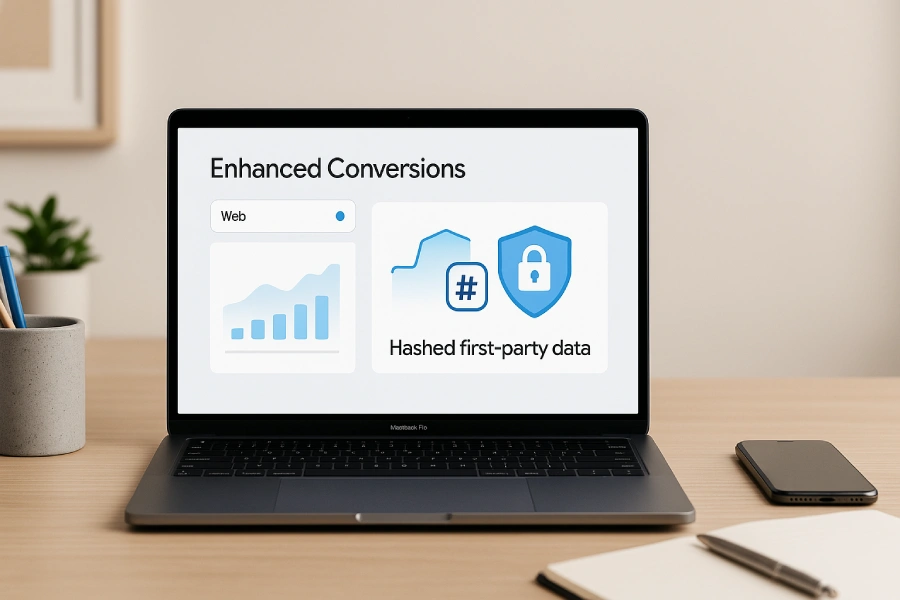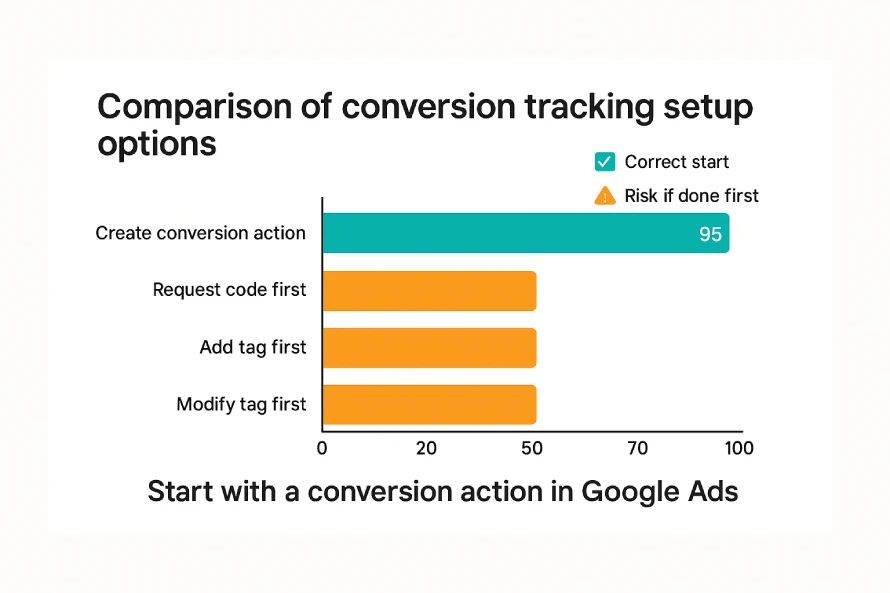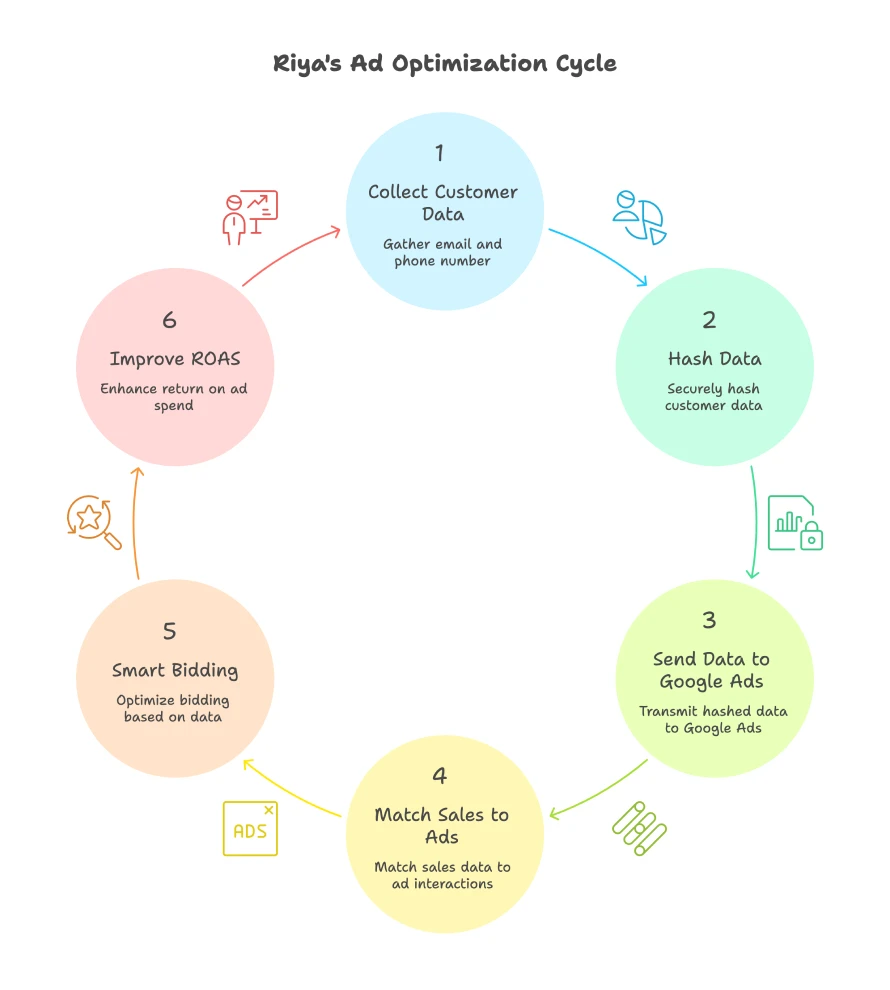The correct answer is “Enhanced conversions for web uses hashed, first-party data to unlock more powerful bidding.” Why is it correct, and why are the other options incorrect? In this content, I will share the full guidelines, and this question is also part of the Google Ads Measurement Certification. So no delay. Let us begin.
If you run ads for your business or help clients with digital marketing, you know many sales and leads are hard to match to ad clicks. Enhanced conversions for web helps by using privacy safe signals from your own site so reporting and bidding get better.

Table of Contents
Question
A marketing strategist is interested in enhanced conversions for web. What description could their agency provide to explain this feature
A. Enhanced conversions for web uses third party data to unlock more powerful bidding.
B. Enhanced conversions for web uses Google Analytics to unlock more powerful bidding.
C. Enhanced conversions for web uses hashed, first-party data to unlock more powerful bidding.
D. Enhanced conversions for web uses third party data to improve the accuracy of your conversion measurement.
The correct answer
C. Enhanced conversions for web uses hashed, first-party data to unlock more powerful bidding.
Why the correct answer is right
Enhanced conversions for web uses hashed, first party data to unlock more powerful bidding.
- Uses data customers enter on your site, like email, phone, or name from checkout or lead forms. This is first-party data from your own pages, not from outside companies.
- Protects privacy by hashing data. Before any data leaves the page, it is converted into a fixed-length code using SHA-256. This code cannot be reversed to reveal the original details. It is only used to try to match the conversion to a Google account.
- Improves match rate. When matches occur, more conversions are counted even with limited cookies or when people switch devices. A better match rate makes reports more accurate.
- Improves smart bidding. With more confirmed conversions, Google Ads learns faster which clicks lead to sales or leads. Bids adjust in real time to focus budget on the best-performing traffic.
- Works with your current tags. Turn it on in the Google Ads conversion action and map the fields in the Google tag or in Tag Manager. No new platform is needed.
- Respects consent and policy. It can work with consent mode so tags adapt to user choices. You only use data that you collected with permission on your site.
Enhanced conversions for web use the data people already give you, hash it for protection, and use it to recover and improve conversion signals for better bidding.
Why the other options are wrong
- A. Enhanced conversions for web uses third party data to unlock more powerful bidding
- What it gets wrong: Third-party data is information collected by outside companies that don’t have a direct relationship with your customers on your site.
- The truth: Enhanced conversions use first-party data from your own pages. This respects privacy and avoids relying on third-party cookies.
- B. Enhanced conversions for web uses Google Analytics to unlock more powerful bidding
- What it gets wrong: It suggests that Google Analytics powers the feature.
- The truth: Enhanced conversions is a Google Ads feature. You enable it inside the Google Ads conversion action and send hashed data with the Google tag or Tag Manager. Google Analytics 4 can be linked to Google Ads, but GA4 is not required for enhanced conversions to work.
- D. Enhanced conversions for web uses third party data to improve the accuracy of your conversion measurement
- What it gets wrong: It again says third-party data is the source.
- The truth: Accuracy improves because your site’s first-party data is hashed and matched. No third-party data is used.
So the only correct description is the one that mentions hashed first party data as the method and more powerful bidding as the outcome.
Comparison table
| Option | Correct | Short reason |
|---|---|---|
| Uses hashed, first party data to unlock more powerful bidding | Yes | Matches how enhanced conversions for web works and why it helps bidding |
| Uses third party data to unlock more powerful bidding | No | Enhanced conversions does not use third party data |
| Uses Google Analytics to unlock more powerful bidding | No | GA is not required and not the core method |
| Uses third party data to improve accuracy | No | Again, third party data is not used |

Real life example
Riya runs an online jewelry shop. On the checkout page, customers enter their email and phone number. Riya enables enhanced conversions for web in Google Ads for her Purchase action.
In Tag Manager she maps the email and phone fields, and the tag hashes them before sending. Over the next weeks, more of her sales are matched back to ads. Smart bidding learns which keywords and audiences bring buyers and shifts spend to those areas. Her return on ad spend improves without changing her site design.

How to enable it in simple steps
1. In Google Ads, go to Tools & settings > Conversions.
2. Edit the website conversion action you want to improve.
3. Turn on enhanced conversions for web.
4. Choose tag based setup or Tag Manager setup.
5. Map fields from your page (email, phone, name, address). The tag will hash them before sending
6. Test with Tag Assistant and watch your conversion diagnostics in Google Ads.
Relevant resource links
- About enhanced conversions for web
- Set up enhanced conversions with Tag Manager
- Set up enhanced conversions with the Google tag
- About consent mode
Conclusion
Enhanced Conversions for web helps advertisers connect more sales and leads to their ads using hashed first-party data from their site. This protects personal information, improves measurement, and gives smart bidding stronger signals. If you want clearer reports and better performance without a complex rebuild, this feature is worth using.
I hope you understand the question and how to choose the right option. If you are ready, you can take the exam on Skillshop for Google Ads Measurement Certification. If you want more real exam questions with full solutions like this one, follow along. I will be breaking down more Google Ads Measurement Certification questions with step by step answers in the next posts on Google Ads.
FAQs
What user data can be used?
Email, phone number, name, and address collected on your site during a conversion. Use only what you already collect with user consent.
Do I need Google Analytics?
No. You can enable enhanced conversions directly in Google Ads and set them up with your Google tag or Google Tag Manager.
Will this work with consent banners?
Yes. When used with consent mode, tags adapt to user choices while estimating missing data.
Is the data secure?
Yes. The tag hashes the data with SHA 256 before sending. The raw data is not shared.
How long until I see results?
You may see improvements in a few weeks as the system learns from new signals and bidding adjusts.
